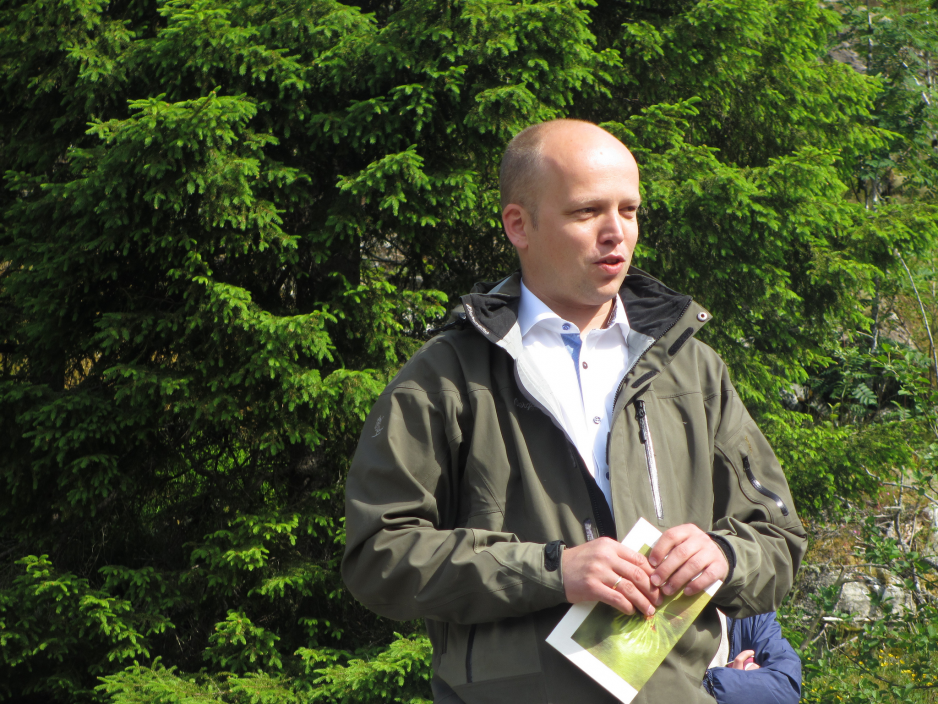Commentary: We Need More Foreign Policy, Not Regional Politics

An increasing number of Center Party mayors in the High North understand the significance of international agreements, yet the national party leadership insists on de-connecting from the rest of Europe. Pictured here; Center Party Leader Trygve Slagsvold Vedum. (Photo: Norden.org)
(Commentary) Slettnes Lighthouse, Gamvik, Finnmark: Northern Norway does not need more regional politics. We need more foreign policy. That is why the Center Party’s dive on recent polls for Northern Norway is a healthy sign.
A poll conducted by Norwegian broadcaster NRK reveals what looks like a political collapse for the agrarian Center Party in Northern Norway. Since April, the party has dived from 35.9 percent to 18.5 percent in Finnmark. Still an almost incomprehensibly high figure, yet far more sober than the euphoria the party was surrounded by in the early stags of the election campaign before the upcoming parliamentary election on Monday, 13 September.
Quite different issues
Election researcher at the University of Tromsø Jonas Stein argues that the drop is down to the Center Party’s “not being able to place regional politics as high on the agenda as it wants”. He is somewhat supported in his analyses by Center Party MP Geir Adelsteen Iversen, who says the political debate in Northern Norway has been quite different from what the party expected beforehand. “The topics discussed have been far different from the primary industries”, he explains.
Bardu Mayor Toralf Heimdal also supports this analysis, and argues a.o. that it has been hard to bring attention to regional politics.
I believe they are wrong, all three of them.
The Center Party is not short of regional politics. It is short of a foreign policy.
The election campaign in the Norwegian High North has been about primary industries and regional politics, though not in the manner the Center Party had wanted it.
Old-fashioned
The Center Party’s old-fashioned and traditional regional politics have been by passed by the international, modern Arctic.
While the Center Party believes that re-opening disused police stations will boost population figures and the economy, an increasing number of people, even amongst Center party mayors in the High North, understand the negative significance of putting international agreements at risk.
The EEA agreement, one that the Center Party wants to cancel, according to the party program, means the world and far more than just police uniforms and fewer predators in the High North.
I have spent the past week at Slettnes lighthouse in Gamvik municipality, Finnmark. One can hardly find a more beautiful and rugged place from which to view the significance of international agreements and cooperation.
The most important source of income for the municipality, by far, is the ocean and fish export. This is also reflected in its inhabitants. Gamvik is the municipality in Norway that has the highest relative number of immigrants in Norway. Some of these invest heavily, very heavily and targeted, in the fish industry. Others work in that same industry.
Blue ocean as far as the eye can see
Outside my window, the Barents Sea stretches out all the way to Alaska, unless you jump ship in Svalbard. Every breaking wave smashing in across the boulders on the seafront have once caressed the hull of a fishing vessel or a ship heading for Murmansk or even further away along the Northern Sea route. The ocean off the coast of Finnmark is an international melting pot.
East Finnmark plays a key role in security politics. An ever-decreasing population threatens the robustness that we as a nation depend on.
Slettnes lighthouse has connected Finnmark to the world ever since 1905
The Center Party is not short of regional politics. It is short of a foreign policy.
And the latter will be crucial for Arctic Norway.
Learn from Slettnes lighthouse
An increasing number of Center Party mayors in Northern Norway realise that.
But it does not help as long as the national party leadership insists that de-connecting from Europe is what it takes to strengthen business and people in the High North.
With a white blink every 20 seconds, Slettnes lighthouse has connected Finnmark to the world and the world to Finnmark ever since 1905, only interrupted by WW2.
A light from a lighthouse is a smiling, committing invitation to international cooperation.
There is no reason to laugh of that, Center Party Leader Trygve Slagsvold Vedum.
Also read
This commentary was originally published in Norwegian and has been translated by HNN's Elisabeth Bergquist.


